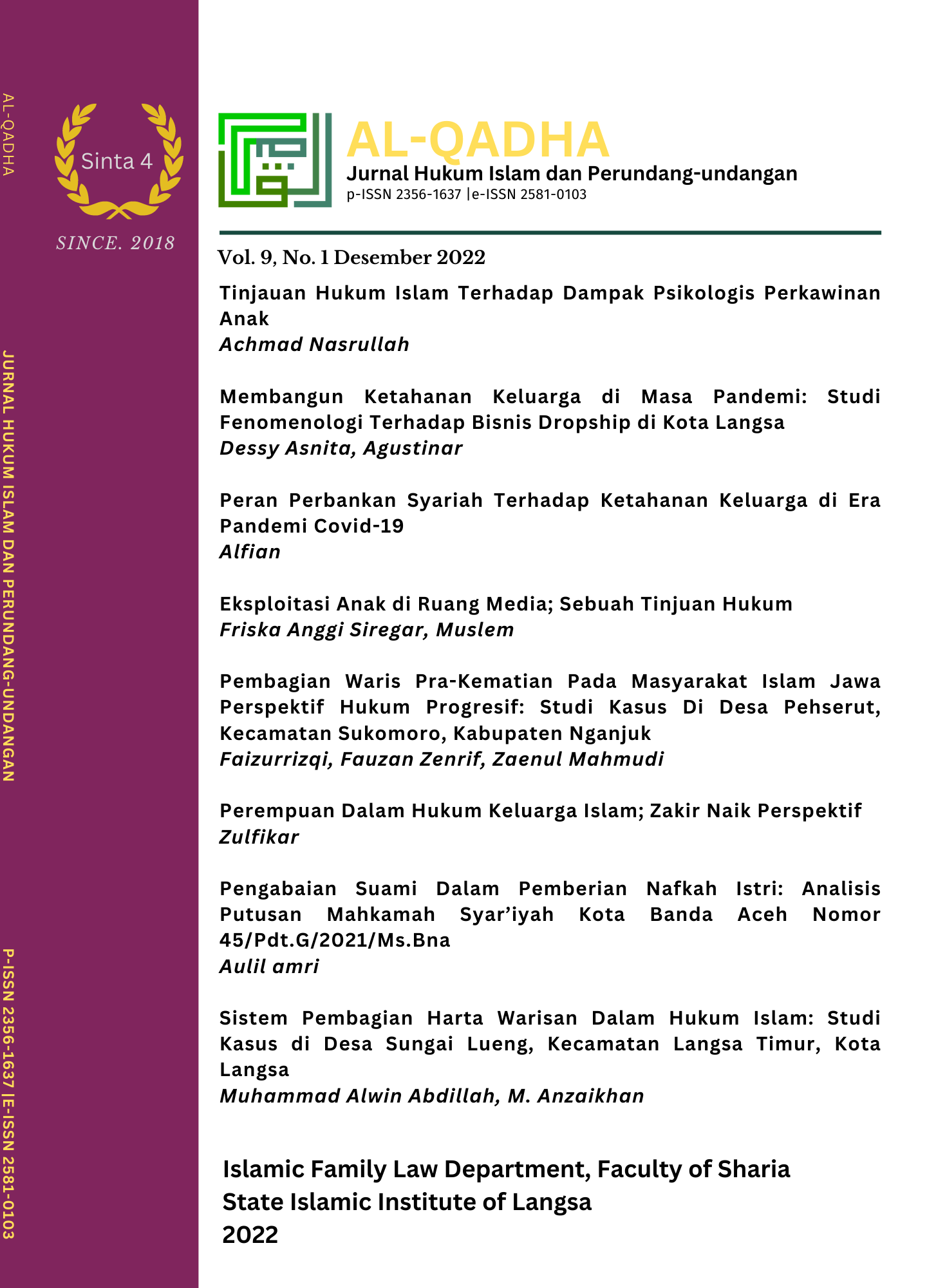Main Article Content
Abstract
Zakir Naik is a popular figure who has contributed to his thoughts on women in Islamic Family Law. This paper aims to describe Zakir Naik's perspective on Islamic Family Law regarding women. This paper is the result of normative legal research in the field of Islamic Family Law using a conceptual approach. The primary legal material in this research is Zakir Naik's book entitled; “Right of Women in Islam, Modern or Outdated” and “Most Common Questions Asked by Non-Muslims” and a number of other books. The technique of collecting data from primary legal materials is carried out thematically. Furthermore, in analyzing the data used content analysis method. The results of the study conclude that Islamic Family Law according to Zakir Naik has given rights to women fairly and proportionally, directly proportional to the roles and responsibilities that must be carried out; both roles as wife, mother and as children. In her role as a wife, women are given the right to accept or reject their future husband. Besides, women as wives are given the right to accept or reject polygamy by their husbands. In their role as mothers, women are given the right to be respected, cared for and loved by their children with a share of 75% compared to fathers.
Keywords
Article Details
References
- Ahamad, Tauffiqu, and Anil Kumar Mishra. “Legal Status and Rights of Women in Indian Constitution.” International Journal of Advanced Research and Development 1, no. January (2016): 33. https://doi.org/10.13140/RG.2.1.5089.8962.
- Ahmad, Akhlaq, Qaisar Khalid Mahmood, Muhammad Saud, Universitas Airlangga, Islamabad Capital Territory, Jalan Dharmawangsa Dalam, and East Java. “Women in Democracy : The Political Participation of Women Perempuan Dalam Demokrasi : Partisipasi Politik Perempuan.” Masyarakat, Kebudayaan, Dan Politik 32, no. 2 (2019): 114–22.
- Ahmad, Meraj Ahmad. “The Importance of Marriage in Islam.” International Journal of Research -GRANTHAALAYAH 6, no. 11 (2018): 1–6. https://doi.org/10.29121/granthaalayah.v6.i11.2018.1082.
- Alawiyah, Nurbaeti, and Iman Santoso. “Speech Act Analysis Of Dr. Zakir Naik’s Speech On Youtube Channel Entitled: Does God Exist.” PROJECT (Professional Journal of English Education) 3, no. 6 (November 13, 2020): 757. https://doi.org/10.22460/project.v3i6.p757-770.
- Alkhodari, Fatiam Tamim, and Hadina Habil. “Analysis of Zakir Naik’s Persuasion Discourse.” International Journal of Engineering and Advanced Technology 8, no. 5 (2019): 1242–46. https://doi.org/10.35940/ijeat.E1177.0585C19.
- Azaan, Back Ground, By Brother, and Yusuf Islam. “Womens ’ Rights in Islam – Modernising or Outdated ? – Part 1” 1 (n.d.): 1–32.
- Bani, Lawal Mohammed, and Hamza A Pate. “The Role of Spouses under Islamic Family Law.” International Affairs and Global Strategy 37, no. 2 (2015): 104–11.
- Baskin, Judith Reesa. “Reading the Women of the Bible (Review).” Shofar: An Interdisciplinary Journal of Jewish Studies 23, no. 2 (2005): 158–60. https://doi.org/10.1353/sho.2005.0046.
- Cheruvallil-Contractor, Sariya. “Motherhood as Constructed by Us: Muslim Women’s Negotiations from a Space That Is Their Own.” Religion and Gender 6, no. 1 (2016): 9–28. https://doi.org/10.18352/rg.10126.
- Depag, RI. “Alquran Pdf Terjemahan.” Al-Qur’an Terjemahan, 2007, 1–1100.
- Harpci, Fatih. “’Ā’isha, Mother of the Faithful: The Prototype of Muslim Women Ulama.” Al-Jami’ah 53, no. 1 (2015): 159–79. https://doi.org/10.14421/ajis.2015.531.159-179.
- Koch, Christopher, and Saeid Barzegarkouchaksaraei. “International Journal of Multicultural and Multireligious Understanding Movement of Female ’ s Rights in the World.” International Journal of Multicultural and Multireligious Understanding 2, no. 6 (2015): 26–32.
- Kusumah, Febriant Argadie, and Deli Nirmala. “Assertive Illocutionary Acts of Zakir Naik in General Lecture on Similarities between Christianity and Islam.” Culturalistis: Journal of Cultural, Literary, and Linguistic Studies 5, no. 2 (2021): 7.
- Mohammad Azad, Mir, and Syeda Shajia Sharmin. “Laws of Muslim Marriage from the Concept of the Holy Qur’an.” International Journal of Engineering and Applied Sciences (IJEAS), no. 5 (2018): 29.
- Mustapha, Maziah, and Mohd Abbas Abdul Razak. “A Critical Appraisal of Zakir Naik’s Islamic Evangelism.” International Journal of Islamic Thought 15, no. 1 (June 13, 2019): 71–83. https://doi.org/10.24035/ijit.15.2019.007.
- Mustapha, Maziah, and Mohd Abbas Abdul Razak. “A Critical Appraisal of Zakir Naik’s Islamic Evangelism.” International Journal of Islamic Thought 15, no. June (2019): 71–83. https://doi.org/10.24035/ijit.15.2019.007.
- ———. “A Critical Appraisal of Zakir Naik’s Islamic Evangelism.” International Journal of Islamic Thought 15, no. June (2019): 71–83. https://doi.org/10.24035/ijit.15.2019.007.
- Naik, Dr Zakir. Women’s Rights In Islam – Protected Or Subjugated? India: Milat Book Center, 2010.
- Naik, Zakir. Answer to Non-Muslims, Common Question About Islam. Mumbai: IRF: Islamic Reasearch Foudation, 2010.
- ———. Common Questions Asked By Non-Muslims. Jakarta Selatan: Da’wah Corner Book Store, 2012.
- Nasution, Ismail Fahmi Arrauf, M Anzaikhan, and Mohd Syahiran Abdul Latif. “Covid-19 In Islamic Theology And Its Impact On Socio-Religious Affairs In Indonesia.” European Journal of Science and Theology 18, no. 1 (2022): 51–65.
- Ridwan, Saftani. “Ketertarikan Terhadap Islam ( Studi Kasus Muallaf Yang Memeluk Islam Dalam Acara Dakwah Dr . Zakir Naik Di Makassar ).” Jurnal Sulesna 11, no. 1 (2017): 1–18.
- Roni, Muhammad, and M. Anzaikhan. “Pembentukan Keluarga Shaleh Dalam Komunikasi Islam: Studi Komparasi Penafsiran Al-Qur’an.” AL-HIKMAH: Media Dakwah, Komunikasi, Sosial dan Budaya 12, no. 1 (June 30, 2021): 51–61. https://doi.org/10.32505/hikmah.v12i1.2825.
- Saryal, Sutapa. “Women’s Rights in India: Problems and Prospects.” International Research Journal of Social Sciences 3, no. 7 (2014): 49.
- Septian, Rio. “Pengaruh Tulisan Ernest Prakasa Mengenai Dr Zakir Naik Di Twitter Terhadap Citra Ernest Prakasa Di Desa Bojonggede.” Jurnal Komunikasi 10, no. 2 (2019): 176–83. https://doi.org/10.31294/jkom.v10i2.6386.
- Syamsiah, Nur. “Women in Gender 2009” 9, no. 2 (2016): 344–65.
- Syefriyeni, Syefriyeni. “Nalar Zakir Abdul Karim Naik (Perspektif Aliran-Aliran Filsafat).” Intizar 24, no. 1 (1970): 141–60. https://doi.org/10.19109/intizar.v24i1.2183.
- Uyun, Dhia Al. “Women ’ s Rights in Indonesian Constitution.” International Journal of Humanities and Social Science 4, no. 8 (2014): 74–84.
